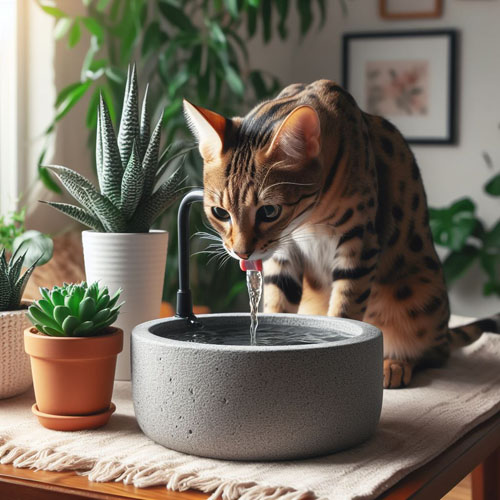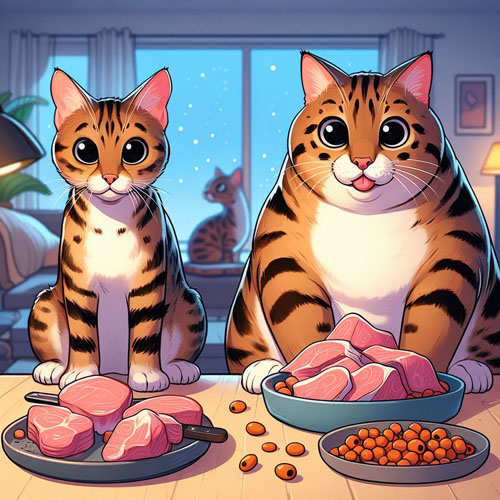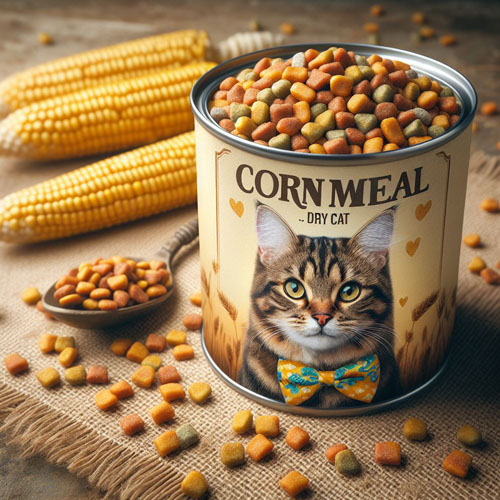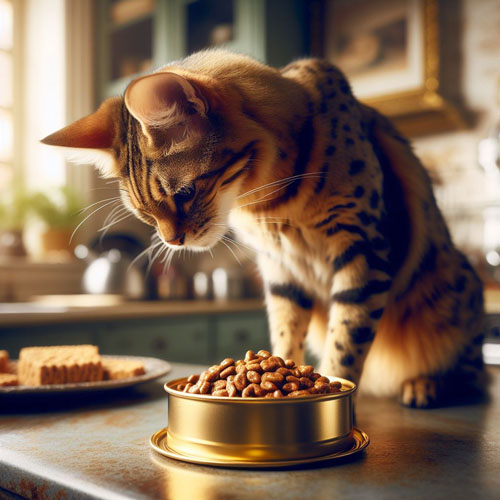Good And Bad Human Foods for Savannah Cats
Navigating the Dietary Maze: Harmful Human Foods for Savannah Cats
Human foods my Savannah Cat can eat
The Savannah cat, with its unique hybrid lineage, also shares the same inherent need for a diet that aligns with its wild ancestry. When exploring the realm of human foods suitable for Savannah cats, certain options stand out as nutritious and fitting for their natural dietary requirements. Let’s delve into some of the human foods that Savannah cats can safely consume, ensuring they receive the essential nutrients vital for their overall health and well-being.
Bananas: Bananas are a tasty and nutritious treat that many Savannah cats enjoy. Rich in potassium, vitamins, and dietary fiber, bananas can be a healthy addition to a Savannah cat’s diet. However, moderation is key, as excessive consumption may lead to digestive issues. Sliced bananas can be offered as an occasional snack, providing a flavorful and vitamin-packed alternative to commercial cat treats.
Eggs: Eggs are a fantastic source of high-quality protein and essential amino acids, making them a suitable addition to a Savannah cat’s diet. Cooked eggs, whether scrambled or boiled, offer a nutritious boost and can contribute to a well-rounded feline diet. Ensure that the eggs are thoroughly cooked to eliminate the risk of salmonella and other potential contaminants.
Pumpkin: Pumpkin, known for its rich fiber content, can be beneficial for Savannah cats, aiding in digestion and preventing constipation. Pureed or cooked plain pumpkin without added sugars or spices is a suitable option. Introducing small amounts of pumpkin into their diet can provide valuable dietary fiber, promoting a healthy digestive system.
Rice: Rice, when properly cooked, is an easily digestible carbohydrate that can be included in a Savannah cat’s diet. It can serve as a bland and gentle option for cats with sensitive stomachs or those recovering from digestive issues. Plain, cooked white or brown rice can be a part of their meal in moderation, contributing energy and additional nutrients.
Raw Meat: Given the Savannah cat’s wild ancestry, a diet that includes raw meat aligns with their instincts and nutritional needs. Raw meat provides essential animal proteins, healthy fats, and taurine, all vital components for their overall well-being. It’s essential to offer a variety of meats to ensure a balanced diet, including options such as raw chicken, turkey, and beef. However, consulting with a veterinarian to ensure proper nutritional balance and the prevention of potential risks associated with raw diets is crucial.
Savannah cats, like other cats, share a common need for specific nutrients derived from a balanced and carefully curated diet. While these human foods can be incorporated into their meals, owners must exercise moderation, ensuring that the overall diet meets all their nutritional requirements. Additionally, regular veterinary check-ups can help monitor their health and address any specific dietary concerns to ensure that Savannah cats thrive on a nutritious and fulfilling diet.
Ensuring your Savannah cat’s diet is diverse and balanced can be both enjoyable and beneficial for their overall well-being. The list of safe human foods for Savannah cats includes a variety of options, from lean meats like chicken and turkey to nutrient-rich fruits like bananas and blueberries. Incorporating small portions of cooked fish, eggs, and even vegetables such as pumpkin and spinach can provide essential vitamins and minerals. Remember to introduce new foods gradually, monitor your cat for any adverse reactions, and always consult with your veterinarian to tailor their diet to meet specific nutritional requirements. With careful consideration, you can offer your Savannah cat a range of tasty and wholesome treats that contribute to their health and happiness. There are many more human foods that are OK in moderation. This list is in no way exhaustive.
- Chicken: Cooked chicken provides a good source of lean protein for Savannah cats.
- Turkey: Similar to chicken, cooked turkey is a safe and tasty meat option.
- Beef: Lean cuts of cooked beef offer essential proteins and nutrients for a balanced diet.
- Pork: Cooked pork can be included in moderation, ensuring it’s lean and free from seasonings.
- Fish (in moderation): Salmon and tuna are rich in omega-3 fatty acids but should be given sparingly due to potential mercury content.
- Blueberries: Packed with antioxidants, blueberries can be a healthy addition to their diet.
- Strawberries: Another fruit option, strawberries offer vitamins and natural sweetness.
- Watermelon (seedless): A hydrating and refreshing treat for cats in small, seedless portions.
- Cantaloupe: Rich in vitamins A and C, cantaloupe can be offered in small, bite-sized pieces.
- Sweet Potatoes (cooked/plain): A good source of vitamins and fiber when prepared without added spices or seasonings.
- Carrots (cooked/plain): Bite-sized, cooked carrots can serve as a crunchy and nutritious snack.
- Broccoli (cooked/plain): Small amounts of cooked broccoli offer vitamins and minerals.
- Spinach (cooked/plain): High in nutrients, cooked spinach can be added to their meals.
- Cheese (in moderation): Some cats tolerate small amounts of cheese, providing a source of calcium and protein.
- Plain Yogurt (in moderation): Contains probiotics and can be offered occasionally, ensuring it’s plain and unsweetened.
Ever found your sizable and affectionate Savannah cat curiously inspecting your dinner plate and wondered about suitable human food options for them? Delve into the information below to discover the answers to such questions and more!
Numerous meats, fruits, vegetables, and grains that constitute human food are also considered safe for Savannah cats. However, it’s crucial for owners to thoughtfully introduce new human food items into their Savannah cat’s diet, always keeping in mind that human food should not be a substitute for their regular feline meals. Even seemingly cat-friendly foods like bananas, tuna, or rice must be administered in moderation and under careful supervision.
Explore the details about some of the well-received human food choices that are deemed safe for Savannah cats. Additionally, continue scrolling to find insights from a survey conducted by Katrina Stewardson on Savannah Cat Central’s YouTube channel. The survey posed a question to viewers regarding the safety of feeding chocolate to Savannah cats – can you guess what the results were?
Foods that can harm a Savannah Cat
While these majestic cats share many characteristics with domestic cats, their dietary needs may differ due to their serval ancestry. Certain human foods, commonly enjoyed by people, can be harmful and even toxic to Savannah cats. It is crucial for owners to be aware of these potential dangers and avoid feeding their Savannah cats the following harmful human foods: chocolate, fried foods, pizza, and sugary treats.
Chocolate: A delight for many humans, contains substances like theobromine and caffeine that can be toxic to cats. Savannah cats, like their domestic counterparts, lack the enzymes necessary to metabolize these compounds efficiently. Ingesting even small amounts of chocolate can lead to symptoms such as vomiting, diarrhea, increased heart rate, and, in severe cases, seizures. Dark chocolate poses a higher risk due to its elevated theobromine content. To ensure the well-being of Savannah cats, chocolate must be strictly off-limits, and owners should take care to store it securely to prevent accidental ingestion.
Fried foods: Another popular human indulgence, can be detrimental to the health of Savannah cats. These foods are often high in unhealthy fats and oils, which can lead to obesity and other related health issues in felines. Obesity, in turn, may contribute to conditions like diabetes, arthritis, and heart disease. Savannah cats, being active and agile creatures, thrive on a balanced diet that supports their energy levels. Feeding them fried foods not only jeopardizes their overall health but also disrupts the nutritional balance required for their well-being.
Pizza: A beloved and versatile meal, is another human food that should not find its way into the diet of Savannah cats. The combination of ingredients commonly found in pizza, including cheese, tomatoes, and various seasonings, can be problematic for feline digestion. Cheese, while not toxic, may cause digestive upset in some cats due to lactose intolerance. Tomatoes contain solanine, a substance that can be toxic to cats, although the levels in ripe tomatoes are generally low. Additionally, the high salt content in pizza can lead to issues like increased thirst and urination in Savannah cats. It is crucial for owners to resist the temptation to share their pizza with their feline companions and instead provide a well-balanced, cat-appropriate diet.
Sugary foods: Such as candies, cakes, and other confections, pose a threat to the health of Savannah cats. Cats lack taste receptors for sweetness, and their bodies are not adapted to process high levels of sugar. Feeding sugary treats can lead to weight gain, dental problems, and potentially more severe issues like diabetes. Owners should be cautious about inadvertently exposing their Savannah cats to sugary foods and carefully read ingredient labels to ensure that their feline friends are not consuming harmful substances.
In conclusion, while it is natural for pet owners to want to share their favorite foods with their Savannah cats, it is essential to prioritize the health and well-being of these unique feline companions. Chocolate, fried foods, pizza, and sugary treats should be strictly avoided to prevent potential health complications. Instead, a carefully curated diet based on taurine-rich meats and other feline-appropriate nutrients is key to ensuring that Savannah cats thrive and lead happy, healthy lives. Regular veterinary check-ups and consultations can also help guide owners in providing the best possible nutrition for their cherished feline friends.
Keywords: Savannah cat diet, Toxic foods for felines, Feline nutrition guidelines, Chocolate and cats, Avoiding harmful human foods for pets





